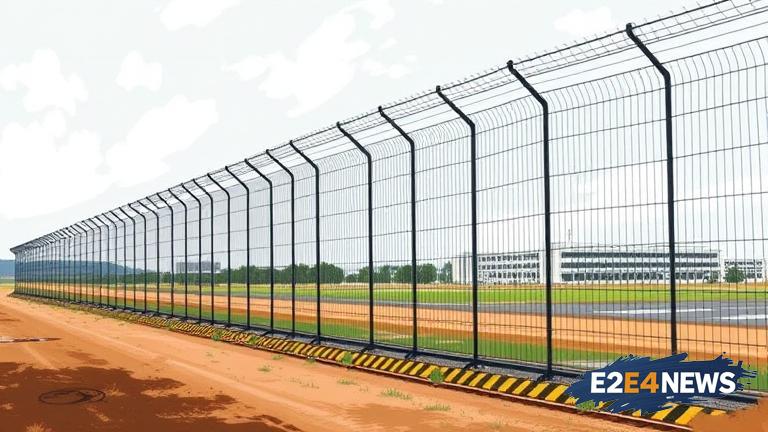The Federal Government of Nigeria has been urged to prioritize the interests of Nigerian manufacturers in the proposed $712bn Lagos airport fencing project. This call to action is aimed at promoting the growth and development of local industries, as well as creating job opportunities for Nigerians. The project, which is expected to be one of the largest infrastructure developments in the country, has sparked concerns among stakeholders about the potential for foreign companies to dominate the project. However, with the right policies and support, Nigerian manufacturers can play a significant role in the project, supplying materials and services that meet international standards. The Lagos airport fencing project is a critical infrastructure development that aims to improve the security and efficiency of the airport, which is one of the busiest in the country. The project is expected to involve the construction of a perimeter fence, as well as the installation of surveillance cameras and other security equipment. Nigerian manufacturers have the capacity to supply a wide range of materials and services required for the project, including steel, cement, and construction equipment. By prioritizing Nigerian manufacturers, the Federal Government can help to stimulate economic growth, create jobs, and reduce the country’s reliance on foreign imports. Furthermore, the project can serve as a catalyst for the development of other industries, such as the steel and construction sectors. The Federal Government has been advised to put in place policies and incentives that will encourage Nigerian manufacturers to participate in the project. This can include providing financing options, tax breaks, and other forms of support. Additionally, the government can work with industry stakeholders to develop standards and specifications for materials and services required for the project. The Nigerian Manufacturers Association has expressed its support for the project, stating that it has the potential to create thousands of jobs and stimulate economic growth. The association has also called on the government to provide the necessary support and incentives to enable Nigerian manufacturers to participate in the project. The Lagos airport fencing project is a significant opportunity for Nigerian manufacturers to demonstrate their capabilities and contribute to the country’s economic development. With the right support and policies, Nigerian manufacturers can play a leading role in the project, supplying high-quality materials and services that meet international standards. The project is expected to be completed within the next few years, and it is hoped that it will serve as a model for future infrastructure developments in the country. The Federal Government has been urged to take a proactive approach to promoting the interests of Nigerian manufacturers, and to work closely with industry stakeholders to ensure that the project is a success. By doing so, the government can help to stimulate economic growth, create jobs, and reduce the country’s reliance on foreign imports. The Lagos airport fencing project is a critical infrastructure development that has the potential to transform the country’s economy, and it is imperative that Nigerian manufacturers are given the opportunity to play a leading role in the project. The project is expected to involve a wide range of stakeholders, including contractors, suppliers, and consultants, and it is hoped that Nigerian manufacturers will be able to compete effectively for contracts and supply agreements. The Federal Government has been advised to establish a project implementation committee to oversee the project and ensure that it is completed on time and within budget. The committee will be responsible for coordinating the activities of all stakeholders, including Nigerian manufacturers, and ensuring that the project is a success. The Lagos airport fencing project is a significant opportunity for Nigerian manufacturers to demonstrate their capabilities and contribute to the country’s economic development, and it is hoped that the Federal Government will take a proactive approach to promoting their interests.
